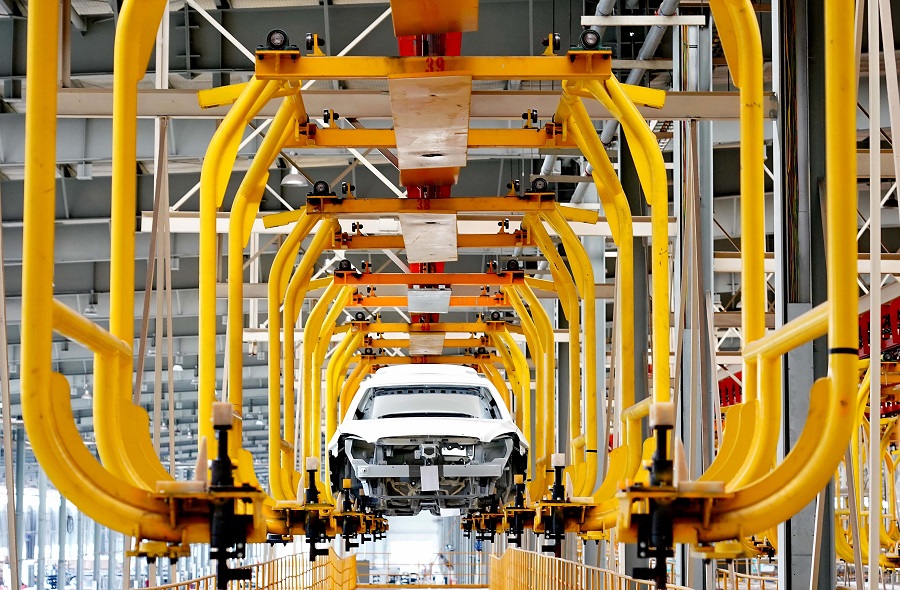Why are Chinese Internet giants racing to make smart electric vehicles?
Many of China’s Internet giants, including Baidu and Xiaomi, have recently issued announcements indicating their decision to seek a share of the market for smart electric vehicles, a market which has already witnessed heightened competition among emerging automakers like Nio, XPeng, and Li Xiang, alongside the active efforts of traditional carmakers like SAIC Motor who are also pursuing a similar transformation.

Photo taken on July 6, 2019 shows a production line at a subsidiary of Beijing Electric Vehicle Co., Ltd. (BJEV), a new energy vehicle producer, in Huanghua city of Cangzhou, north China's Hebei Province. (Xinhua/Yang Shiyao)
At the recent 2021 new product launch event for Xiaomi, Lei Jun, founder, chairman and CEO of Xiaomi Inc., said that the company will enter the smart electric car market and will aim to spend $10 billion on the new business in the coming 10 years.
Early last January, Baidu announced its plan to officially establish a smart vehicle company and enter the auto industry as a manufacturer of finished vehicles.
In addition, Didi Chuxing, a popular mobile car-hailing platform in China, also recently expressed its intention to enter the arena in the future.
Significant development momentum, bright market prospects, and strong policy support have made many enterprises embrace forecasts indicating that the smart electric vehicle industry will become the most important field for investment over the next 10 years.
By 2020, China had ranked first in the world for six consecutive years in terms of its production output and sales of new energy vehicles (NEVs), with the cumulative sales volume for such vehicles exceeding 5.5 million.
This January to March, China’s output and sales of NEVs reached 535,000 and 515,000 units, respectively, rising by 3.2 times and 2.8 times compared with the same period last year. The sales volume in the first quarter of this year hence represents a new high.
The China Association of Automobile Manufacturers predicted that the country’s total output and sales volume for NEVs may surpass 1.8 million this year and that the industry’s sound development momentum is expected to continue into the foreseeable future.
Sales of NEVs are expected to comprise about 20 percent of total new car sales by 2025, according to a development plan on the NEV industry for the period from 2021 to 2035 released by the General Office of the State Council.
China has provided a slew of favorable policies for the development of NEVs in recent years. Last year, China’s Ministry of Finance worked with relevant departments to extend subsidies for the purchase of NEVs to the end of 2022, and meanwhile guaranteed that the subsidies would be reduced gradually and at a slow pace.
Promotional activities for NEVs have been scheduled for the period between March and December this year in rural areas of China’s provincial-level administrative regions, including Shanxi, Jilin, Henan, Hubei, Hunan, Guangxi, Chongqing, Shandong, Jiangsu, Hainan, and Sichuan, as outlined in a recent circular on promoting NEVs in rural areas in 2021, which was jointly issued by China’s Ministry of Industry and Information Technology, Ministry of Agriculture and Rural Affairs, Ministry of Commerce, and National Energy Administration.
Infrastructure facilities for NEVs, including charging piles, have also enjoyed great support from the Chinese government.
Relevant supporting policies rolled out in recent years have covered a variety of areas associated with charging facilities for NEVs, such as financial rewards, subsidies, and preferential electricity pricing, as well as the construction, operation, and supervision of facilities, said Liu Yongdong, director of the center of standardization under the China Electricity Council.
As of the end of 2020, the number of public charging piles in China had reached 807,300.
The country now has a full-fledged NEV industry chain. Shanghai Chargedot New Energy Technology Co., Ltd. (Chargedot), a leading Chinese e-mobility solutions provider, has provided household charging piles and other charging products for automakers, including SAIC Volkswagen, Geely Auto, GAC Toyota Motor, and Dongfeng Nissan, according to Chen Xixi, co-founder of Chargedot.
Chargedot’s annual shipments of charging piles have reached 100,000 sets, Chen said, disclosing that the company also provides car rental companies with intelligent charging facilities and platform management systems, while offering charging facility operators comprehensive and customized turnkey solutions for intelligent charging, and is able to meet the diversified demands of clients along the NEV industry chain ranging from charging to operational services.
In addition to all these recent trends, the relatively high business value of the industry is considered to be an important reason for why various enterprises are bullish about electric vehicles.
“Smart electric vehicles represent the broadest track for development in the coming 10 years, an integral and key part of the ecosystem for artificial intelligence (AI), and the road Xiaomi must take to continue fulfilling its mission and helping people to realize their aspirations for a better life with continued advancements in science and technology,” said Lei.
Engaging in the intelligent vehicle industry is one of Baidu’s important means to promote the application of AI technologies and benefit society as a whole, according to the company, which noted that it believes that there is great business value and expansive room for growth in the industry.
Photos
Related Stories
- Pure electric vehicles to wrest market share in 2035: expert
- China's iconic Hongqi starts selling first electric vehicle
- First batch of electric taxis hits road in China's Ningxia
- Booming electric vehicle industry leads Guangdong's green development
- China's EV not to massively replace traditional vehicles in near future: Chinese energy firm
- Chengdu mandates charging stations for electric vehicles in new residential communities
- Faraday Future unveils first electric vehicle
- LatAm Show of electric vehicles, new technologies held in Argentina
- China takes leap in electric vehicle manufacturing
- Xinjiang to promote cheap electric vehicles in poor regions
Copyright © 2021 People's Daily Online. All Rights Reserved.










